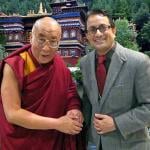
Knowing that my wife had headed off this morning for Newport Beach, a couple of friends called to invite me out to lunch and to a showing of Dinesh D’Souza’s new film, Death of a Nation. I guess I’ve been traveling too much; I hadn’t even heard of the movie.
Having now seen it, I must say that, to my judgment, it’s too black and white, too partisan, and far too enthusiastic for the specific person of Donald Trump. I simply cannot bring myself to see Mr. Trump as the true heir of Ronald Reagan.
And — this won’t bother many Americans, I admit — it bothered me that, in the film’s frequent recreations of scenes involving Adolf Hitler and Nazi Germany, the actors spoke reasonably good German but were plainly not native speakers of the language. (They were, in fact, as the credits later showed, Czechs.)
With all of that said, though, there are a number of things about the film that I liked, or that, anyway, I think raise points worth discussing.
I’ve insisted since I was in high school, for example, that it makes no sense whatever to put fascism and Nazism (the name of which, after all, is an abbreviation of Nationalsozialismus) on the right end of the political spectrum while communism and socialism are over on the left. Both involve the exaltation of the state and the collective over the rights of the individual.
(Making that point — not even very forcefully — once earned me expulsion from an American government class in high school. My teacher was a card-carrying member of some socialist party or other, and he didn’t like what I had to say. I simply asked him, since he had just told us that Hitler was on the right and then, a few minutes later, that Jefferson, were he alive today, would also have been on the — less extreme — right, whether that made Jefferson a moderate Nazi or Hitler an extreme Jeffersonian democrat. “That’s stupid,” he responded, suddenly rather angry. “That’s exactly my point,” I replied. And I was directed to leave.)
D’Souza does a good job of pointing out some of the affinities, and even some of the historical links, between American progressivism and European fascism and Nazism. (I would also recommend Jonah Goldberg’s Liberal Fascism: The Secret History of the American Left, From Mussolini to the Politics of Change.)
Additionally, I thought that his interview with the reprehensible Richard Spencer, often regarded as the founder of the so-called alt-right movement, was eye-popping. If Spencer’s views are conservative, I’m a reptilian shape-shifter from Azerbaijan. Spencer is a white supremacist and a statist who is comfortable with socialism, an atheist who denies that humans have intrinsic rights but insists that any rights we have are revocable gifts of the government, a critic of the American Founders, a vocal opponent of veneration for the Constitution, and someone who, at his speeches, has been known to cry out Hail Victory! (which translates very literally into German as Sieg Heil!) and who says that he’s at ease with people who respond to that cry with extended straight-right-arm salutes.
The funniest part of the film comes near the beginning, when we’re shown the reactions of liberal television commentators and street protestors to the Trump victory on Election Night 2016. Seeing those again could almost make me a Trump supporter. For a few seconds, at least.
The most moving part of the film, to me, comes near the end. It’s the reenactment of part of the story of the heroic Sophie Scholl, a student at the University of Munich who was beheaded by the Third Reich in 1943, at the age of twenty-one, because of her anti-Nazi efforts with the non-violent Weiße Rose (White Rose) resistance group.
On the whole, I would recommend Death of a Nation, along with a good conversation afterwards.











